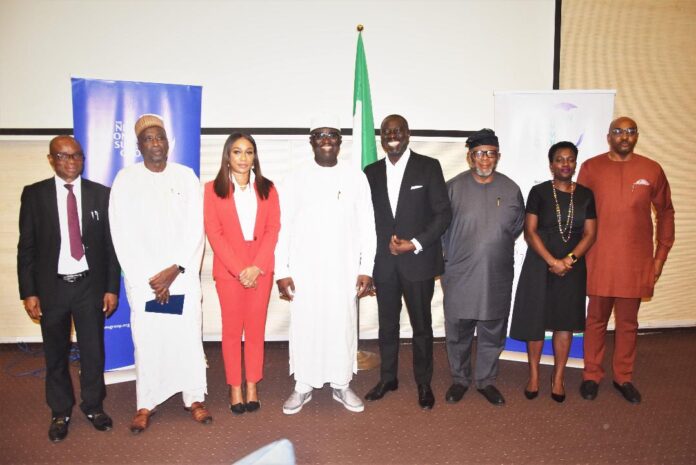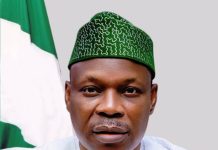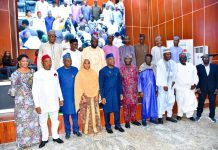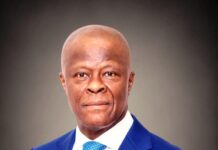
Minister of State, Budget and National Planning, Prince Clem Ikanade Agba, on Wednesday (November 9, 2022), announced that the 28th National Economic Summit would hold from the 14th-15th of November 2022, with the theme “2023 and Beyond: Priorities for Shared Prosperity”.
Agba made this known while delivering his address at the media briefing for the Twenty-Eight Nigerin Economic Summit (NES#28) in Abuja.
The Minister stated that the theme for NES#28 was carefully chosen to discuss priorities for post 2023 with emphasis on the policies and strategies captured in the National Development Plan (NDP) 2021-2025 and Nigeria Agenda, NA, 2050.
He explained that the NA 2050 was designed to transform the country with a Per Capita Income of $33,000 while the NDP 2021-2025 was designed with the vision to unlock the country’s potential in all sectors of the economy for a sustainable and inclusive national development.
He added that NA 2050 would be implemented through a series of six number 5-year Medium Term Plans and Annual Budgets.
According to.him: “The plan is meant to drastically bring poverty rate to 0.6% and unemployment rate to 6.3%, while transforming the economy to the highest per capita GDP in the group of Upper-middle Income Economies.”
“The private sector will be the engine of growth of the economy, while the government will implement policies and regulations that promote favorable business environment to achieve high rate of investment and savings.
“The investment is necessary to raise the economy to a GDP of $11.7 trillion by 2050 while structural barriers that constrain the vulnerable segment of the society from realizing its potential are addressed,” he stressed.
He said that the Joint Planning Committee for the NES#28 as inaugurated by himself was sectioned into 5 sub-committees namely: Technical, Fundraising and Mobilization, Media and Publicity, Editorial and Event Planning, all designed to ensure effective delivery of the summit.
The Minister disclosed that the discussions at the summit would have four themes namely: Delivering Macroeconomic Stability for Shared Prosperity, investing in the Nigeria future, Unlocking the Binding Constraints to Education and Reframing the Agenda for Transformational Leadership.
He said that to achieve these themes, the summit would identify critical factors for effective implementation of the national development plan for sustained economic development, set an economic policy agenda for accelerated economic growth underpinned by sustainable and inclusive development, articulate the framework within which economic priorities for Nigeria in 2023 and beyond are debated, discussed and agreed upon.
Earlier, Chairman of the Nigerian Economic Summit Group (NESG), Mr Asue Ighodalo, in his opening remarks, pointed out that the nation was in a season of social discontent characterized by massive economic pressures and challenges on businesses and the citizens.
He regretted that macroeconomic instability was driven by stagflation, pushing more people below the poverty line, as the World Bank estimated 7 million Nigerians in extreme poverty by this year, 2022, alone.
“These socioeconomic pressures are accentuated by rising food inflation and a growing food insecure population that the World Food Programme puts at 61 Million as of October 2022.
“This situation has over 38% of our under-5 children experiencing chronic malnutrition and 70% of our children suffering from Learning Poverty (lacking basic literacy and numeracy skills)” he explained.
Ighodalo said that Nigeria’s age-long challenges were connected with macroeconomic instability experienced in the country over time.
According to him, “the unstable macroeconomic space is reflected in high inflation, exchange rate volatility, constricted fiscal space, weak external reserves, and balance of payments problems.”
He said this, in addition to social and political instability, had proved the extent of Nigeria’s vulnerability to shocks.
“In 2021, Nigeria was ranked among the bottom half of African countries classified as less resilient to shocks by the African Development Bank (AfDB),” he stated.
He further explained NESG’s intention to unveil critical challenges like unemployment surge, huge infrastructure deficit, fiscal weakness, human capital and skills gap, flawed security architecture, and corruption for urgent attention, “hence the summit delves into the causes and implications of the highlighted critical challenges.”
He noted: “it has designed plenaries and panel sessions to debate and reach the policy consensus to transform Nigeria into a strong, inclusive, prosperous, corrupt-free, and globally competitive and sustainable economy in 2023 and beyond, hence our theme for the 28th Nigerian Economic Summit.”
Ighodalo further expressed hope that in five years’ time, Nigeria could become a leading industrializing and reforming nation in Africa that “focuses on building its State capacity and capabilities in five years’ time.”





